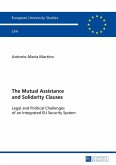This book examines the rapid shift from analog to digital life, accelerated by the pandemic, and its profound impact on diplomacy. As technology has advanced, new actors-especially Big Tech companies-now wield significant influence over international relations, global governance, and the world order, sometimes surpassing the power of governments.
The book addresses the challenges of diplomacy in the digital age from various perspectives, incorporating insights from diverse actors and disciplines, including universities, the private sector, and Science, Technology, and Innovation (STI) diplomacy. It also examines how different state approaches to digital governance impact the long-term resilience of their democracies.
This publication is a collaborative effort between university scholars and international experts, developed within the research group "EU Diplomacy Future 4 Digital Age," led by the Institute of European Studies and Human Rights at the Pontifical University of Salamanca.
The book addresses the challenges of diplomacy in the digital age from various perspectives, incorporating insights from diverse actors and disciplines, including universities, the private sector, and Science, Technology, and Innovation (STI) diplomacy. It also examines how different state approaches to digital governance impact the long-term resilience of their democracies.
This publication is a collaborative effort between university scholars and international experts, developed within the research group "EU Diplomacy Future 4 Digital Age," led by the Institute of European Studies and Human Rights at the Pontifical University of Salamanca.









